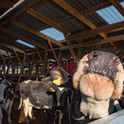In this week's New Yorker, Bill Buford has written an article about the revival of carnivore culture. It contains the following passage: "Meat comes from an animal—a banal connection that has been obscured by the way supermarkets prepare and present our food—and the animal has to be killed. If you fear the sight of a carcass, you shouldn't be eating from it." This logic has become virtually axiomatic among right-thinking carnivores, but I wonder if it really makes sense. I agree with the first part. We shouldn't take the fact that we kill animals to eat lightly. If a society forgets (or pretends to forget) that meat comes from animals, then it is more likely to turn a blind eye to their mistreatment—as has undoubtedly happened.
But what about the second part of the above passage: the idea that for it to be justifiable for a person to eat meat, he or she should not "fear" the sight of a carcass? By this logic, there is a kind of hierarchy of entitlement to meat-eating, corollated to how unfearful one is. At the top would be those actually prepared to kill an animal themselves. Then would come those prepared to butcher a carcass. Then would be those prepared to at least stand the sight of a skinned animal hanging upside down in a butchers' shop. And so on, all the way down to those who shrink from anything other than a processed sausage. But surely this is all so much romantic baloney. The reality of modern technology means that we are, to a large extent, detached from the sordid business of killing animals. We don't live in caves any more. Why should we not be entitled to eat meat if we are squeamish about carcasses? Buford might claim that squeamishness about dead flesh suggests an unwillingness to confront the fact of death squarely in the face. Yet one might just as easily argue it the other way: a desire to chop up an animal could be taken as evidence of indifference to—even delight in—the fact of death. But in any case, does it really matter either way? Rather than basing entitlement to meat-eating on a somewhat arbitrary conscience-based yardstick, surely we should base our judgements solely on behaviour. And if we do this, then it seems to me that we can conclude little more than the following: it is better to eat meat from animals that have been raised humanely than from those that have been caused unnecessary suffering.
Meat-eating morals
November 28, 2007













